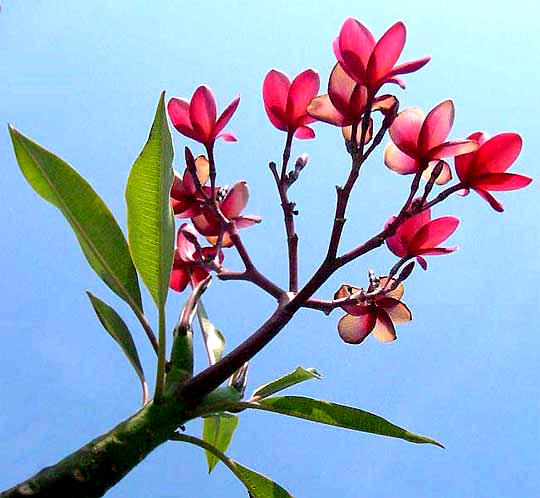 101 YUCATAN TREES
101 YUCATAN TREESby Jim Conrad
2015 edition
 SHORTCUTS:
SHORTCUTS:
ACKNOWLEDGMENTS
Ornamentals | Fruit Trees | Wild Trees | Rare & Unusual Trees
If you've traveled much in the world's tropics, already you've met many of the most conspicuous and attractive of urban and small-town Yucatan's ornamental trees. That's because the most attractive ornamental trees are carried around the world. Many of our species come from other places, but a surprising number are native to the Yucatan, and have been introduced elsewhere.
 Chinese Banyan/ Laurel
Chinese Banyan/ Laurel At first glance, backyards in typical Mayan villages look chaotic. However, up close you can see that usually they are sophisticated examples of agroforestry. In other words, plants and animals are being managed as a sustainable ecosystem efficiently producing food for the family throughout the year. Attempts to grow Northern-type gardens in the Yucatan fail because of diseases, the plants being eaten by animals, and the habitually thin, organic-matter-impoverished soil. Consider the backyard of a home in the village of Sabacché about an hour by car southeast of Mérida here.
No one doubts that the Yucatan is a geological peninsula, but few realize that it's an ecological island. Ecologically, it's isolated by the sea along its eastern, northern and western sides, and ecologically, it's a semi-arid environment separated by land to environments to the south, which are much rainier.
The Yucatan, then, is an island of aridity, and Darwin's experiences in the Galapagos remind us that on islands unique species tend to evolve. Nearly 10% of the Yucatan's plant species are endemics -- naturally found nowhere else on Earth. The Yucatan is home to 14 endemic cactus species, and the northern Yucatan -- the most arid part of the arid island -- has ten of them.
One worrisome feature about all this is that a lot of land along the Yucatan's northern coast -- exactly where so many endemics cluster -- is being "developed," largely by English-speaking northerners building retirement homes. The first step in this process typically is to "clean away the scrub."
Theoretically, regulations are in place to protect important species but from what can be seen is that economic realities are allowing too much endemic-rich scrub to be "cleaned up." English-speaking residents, then, have a special duty to pay attention to this problem.